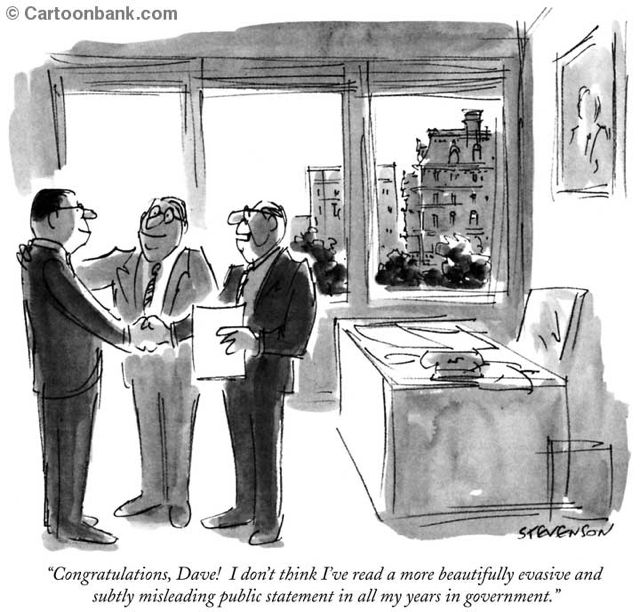Worth Reading: What Orwell Didn’t Know
What Orwell Didn’t Know: Propaganda and the New Face of American Politics, edited by András Szántó, Public Affairs Press, 2007.
George Orwell’s seminal essay “Politics and the English Language” noted that precision in language is a reflection of clear thinking. Imprecise language not only reflects weak thinking on the part of the writer or speaker, it causes weak thinking among its audience. Says Orwell:
An effect can become a cause, reinforcing the original cause and producing the same effect in an intensified form, and so on indefinitely. A man may take a drink because he feels himself a failure, and then fail all the more completely because he drinks. It is rather the same thing that is happening to the English language. It becomes ugly and inaccurate because our thoughts are foolish, but the slovenliness of our language makes it easier for us to have foolish thoughts.
But Orwell wasn’t interested merely in being society’s copy editor. He noted the nefarious consequences of debasement of language in the political realm:
Political language – and with variations this is true of all political parties, from Conservatives to Anarchists – is designed to make lies sound truthful and murder respectable, and to give an appearance of solidity to pure wind.
 What Orwell Didn’t Know is a collection of 18 essays that serve as a companion to a conference held last November at the New York Public Library, “There You Go Again: Orwell Comes to America,” organized by the Open Society Institute. The idea for the conference and the book arose in discussions among five journalism school deans who wanted to address the sorry state of public debate in America.
What Orwell Didn’t Know is a collection of 18 essays that serve as a companion to a conference held last November at the New York Public Library, “There You Go Again: Orwell Comes to America,” organized by the Open Society Institute. The idea for the conference and the book arose in discussions among five journalism school deans who wanted to address the sorry state of public debate in America.
Unsurprisingly for a book sponsored by a progressive group, some of the essays take a sharp look at the practices and rhetoric of the Bush administration. Others review recent insights into persuasion theory and the formation of public opinion – literally what Orwell didn’t know. Yet others hold journalists to account for being seduced by sizzle and missing the steak of significant questions of policy. The book concludes with Orwell’s 1946 essay.
But regardless of a reader’s political affiliation, the book is a welcome, and in some ways necessary, reminder that words matter; that language shapes society; that abuse of language – whether in politics or advertising or the workplace – has consequences.
In later posts I will unbundle some of the individual essays, but here I’ll preview a few.
Martin Kaplan, the Norman Lear Chair in Entertainment, Media, and Society at the USC Annenberg School, provides what to my mind is the single best critique of journalism as it is currently practiced. It is a wakeup call to journalism and to citizens. Says Kaplan:
The notion that professional news judgment – a reliable journalistic rulebook – is what really drives the nature and kind of coverage is hopelessly quaint. The truth is that a missing white woman can easily be turned by the media machine into a global red alert, and a holocaust in Africa can be marginalized as a sidebar story.
He also describes what he calls crisis porn:
Here’s what cable news is really good at: trapped miners, Michael Jackson, runaway brides, missing blondes, Christmas Eve murders, Princess Di, Paris Hilton, hurricanes, Tsunamis, disinformation, whiz-bang graphics, scary theme music, polls, gotcha, HeadOn ads, ‘Thanks for having me,’ people who begin every answer to antagonistic questions with ‘look,’ people who say ‘I didn’t interrupt you while you were talking,’ and anchors who say ‘We’ll have to leave it there.’
Here’s what cable news is not so good at: insight, context, depth, reflection, proportion, perspective, relevance, humility, information, analysis, news.
Kaplan’s essay alone is worth the price of admission.
Framing guru George Lakoff, the Berkeley cognitive linguist, reviews developments in cognitive science since Orwell, particularly how words and metaphors influence thinking.
Lakoff notes:
Orwell fell into traps – false views of language. Meanings are truth conditions. Words have unitary meanings. If people are told the truth, they will reason to the right conclusions – unless they are stupid or ignorant. And ignorance can be cured by truths conveyed in good prose.
All of that is false…. Thought is structured, in large measure, in terms of ‘frames’ – brain structures that control mental simulation and hence reasoning… Words are neural links between spoken and written expressions and frames, metaphors, and narratives. When we hear the words, not only their immediate frames and metaphors are activated, but also all the high-level worldviews and associated narratives – with their emotions – are activated. Words are not just words – they activate a huge range of brain mechanisms.
Susan Harding, a professor of anthropology at UC Santa Cruz, who has written extensively about the religious right, takes Lakoff’s framing to a new level. She describes a process of “revoicing,” whereby controversial positions and institutions become mainstream by co-opting the symbols and vocabulary of the mainstream. She gives an example of the late Rev. Jerry Falwell:
Falwell’s church ministries, media and political organizations, and educational institutions were, in effect, a hive of cultural workshops in which both fundamentalist and secular ideas, images, narratives, and practices were smelted, refashioned, melded, packaged, and distributed with spectacular success.
Falwell’s Lynchburg Baptist College morphed into a liberal arts college, Liberty Baptist College, and then into a university, Liberty University. The Museum of Earth and Life History on its campus occupied the cultural space of a museum of natural history, but recorded displays of man and beast with the assumptions of creation science rather than evolution. Liberty Godparent Homes converted a former home for unwed mothers into a staging ground for pro-life save-a-baby narratives that in turn revoiced feminist story lines in born-again Christian terms.
Despite the progressive sponsorship of the conference and the book, the authors note that all sides of the political spectrum make explicit reference to Orwell and can be held to account for deceptive language. Nicholas Lemann, dean of the Columbia University Graduate School of Journalism, notes:
All politicians use slogans. Most significant legislation is given a meaning-obscuring name, for instance the USA PATRIOT Act and the No Child Left Behind Act. The way we respond to these uses of language is partly conditioned by our political preferences. Conservatives, who admire Orwell today no less than liberals do, find Franklin Roosevelt’s New Deal and Lyndon Johnson’s Great Society (pretty names for great expansions in the charter of the federal welfare state) to be Orwellian uses of language.
Every recent president has seemed to his opposition to have used political spin at an unprecedented and alarming level, and every party out of power believes that if it can only use language more effectively (as opposed to more honestly), it will win again.
Lemann closes with an admonition that however important language may be, it isn’t the entirety of the challenge:
There are real limits to how what’s wrong with politics can be fixed linguistically. Many people participate in politics through group membership, not through consuming messages delivered through mass media.
People in interest groups, whether they’re environmentalists or beet farmers, usually come to politics with their minds made up, or at least with a frame of reference so powerful (legal abortion is like the Holocaust) that it lies completely outside the bounds of the general public debate. They are not susceptible to persuasion, but that means they can’t easily be misled or brainwashed either.
The target of political language is the marginal players, not the committed ones; conversely, active and widespread political participation decreases the importance of language, and thus, for good or ill, reduces the role of writers, intellectuals, and propagandists in the political system.
I intend to assign What Orwell Didn’t Know to my NYU communication ethics graduate students. I strongly recommend it to anyone interested in the power of language, ethics or politics.




Leave a Reply
Want to join the discussion?Feel free to contribute!